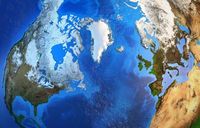Greenland, the world’s largest island, is asserting its identity amid renewed talks of U.S. annexation by former President Donald Trump. A recent poll from a Greenlandic newspaper revealed a striking sentiment: a resounding 85% of Greenlanders do not wish to join the United States, while only 6% support Trump's controversial proposal to annex the territory. In a time where global powers vie for influence over the Arctic, the voices of the indigenous Inuit people of Greenland echo a profound desire to maintain their sovereignty.
Prime Minister Múte Bourup Egede, representing the vast majority of Greenland’s population, made it unequivocally clear: "We don’t want to be Danes. We don’t want to be Americans. We want to be Greenlanders." This declaration encapsulates a growing sense of nationalism amongst Greenlanders who have spent centuries under colonial dependencies, first with Denmark and now with the looming threat of U.S. imperialism.
Concerns heighten as the proposed annexation has sparked reactions in the U.S. Congress, where Republican Congressman Earl “Buddy” Carter has introduced a bill aimed at facilitating negotiations for the acquisition of Greenland, even suggesting renaming it "Red, White, and Blueland." Behind this political theater lies a serious strategic context; Greenland’s significance is underlined by U.S. Vice President JD Vance’s claim that it is "really important to our national security," particularly due to its positioning along crucial sea routes utilized by both China and Russia.
In the broader context of climate change, melting ice is opening new shipping lanes that are drawing the attention of global powers. Greenland is estimated to possess at least 25 of the 34 minerals classified as critical raw materials by the European Commission, including rare earths, copper, and uranium. This immense resource wealth is regarded as a potential carrot for foreign investors and governments seeking to bolster their own economic and strategic interests.
As rumors of military threats swirl around Trump's administration, speaking candidly about the need for an increased U.S. presence in the Arctic, the geopolitical stakes have never been higher. During a recent meeting with NATO Secretary General Mark Rutte, Trump avowed, "We need [Greenland] for international security," cautioning about the dangers posed by rising Chinese influence in the region.
Simultaneously, leaders from all five political parties in Greenland have united in a joint statement condemning Trump’s plans. They collectively asserted their determination to oppose any attempt at annexation, stating, "We cannot accept the repeated statements on annexation and control of Greenland… we find this conduct unacceptable." This political cohesion is indicative of the island’s broader aspirations for independence.
Adding a layer to this discourse is the United States' military history in Greenland, which includes one known military base—the Pituffik Space Base—and the broader implications of American military presence. The U.S. defense relationship with Denmark, governed by the 1951 defense agreement, allows significant flexibility for Washington to act in the region, raising concerns about sovereignty and self-determination among Greenlanders.
Amidst these geopolitical tensions, Greenland finds itself navigating the treacherous waters of great power competition. The kingdom of Denmark has been in a complex relationship with its autonomous territory; while Copenhagen provides substantial financial support through annual block grants worth approximately 500 million euros, it also faces internal pressures to address the desires of Greenland’s populace who seek more autonomy.
Trump’s potential "purchase" of Greenland isn't an entirely novel concept—historically, figures such as Andrew Jackson and Harry S. Truman have attempted similar negotiations. Truman even offered $100 million in gold back in 1946, reflecting a long-standing American interest in Greenland as a strategic asset. However, as the territory's reported market value has sky-rocketed in the modern context to estimates ranging from $12.5 billion to $1.1 trillion, Greenlanders remain firmly opposed to the notion of commodifying their homeland.
The pressure exerted by international dynamics is palpable. Trump's administration, tied up with great power rivalries, is keen to secure resources and maintain military control in proximity to both Russian and Chinese interests. Greenland's strategic significance shines brightly against this backdrop, prompting questions about how much further the U.S. will go to cement its influence in the Arctic.
Greenlanders, however, are adamant about their stance. The sentiment within Greenland was well captured when Prime Minister Egede expressed, "We will never in any way become part of the USA and become Americans." This call echoes across the island, resonating not just through governmental corridors but through the streets of Nuuk where protests decry foreign ambitions with slogans loud and clear—"Aggression! Don’t take over our country! You are not welcome!"
With a small population of around 57,000 predominantly of indigenous descent, the people of Greenland embrace their cultural identity more fervently than ever, pushing back against the idea of subservience to another country or imperial power. As the world watches this unfolding saga, it becomes evident that Greenland's resolve may serve as a defining shield against the encroaching tides of imperialism.
Ultimately, as the situation develops, the conclusion emerges that Greenland is steadfast in its fight for independence, remaining determined to chart its own future free from external domination. The aspirations of Greenlanders speak not just to their identity, but to a broader human right—the right to self-determination amidst the world’s shifting geopolitical landscape.





